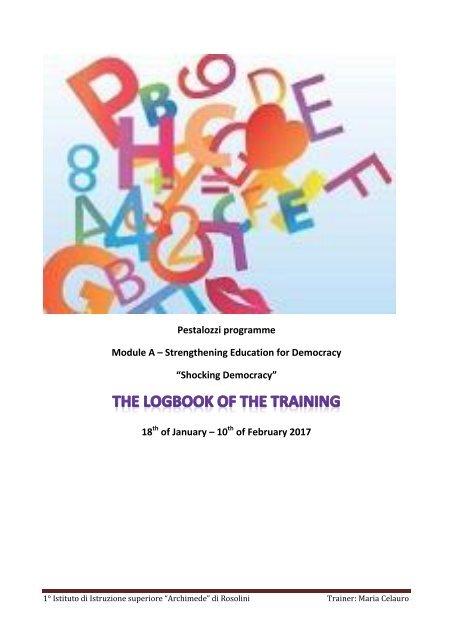Shocking Democracy LogBook
Logbook of the training course for teachers on Democracy
Logbook of the training course for teachers on Democracy
Create successful ePaper yourself
Turn your PDF publications into a flip-book with our unique Google optimized e-Paper software.
Pestalozzi programme<br />
Module A – Strengthening Education for <strong>Democracy</strong><br />
“<strong>Shocking</strong> <strong>Democracy</strong>”<br />
18 th of January – 10 th of February 2017<br />
1° Istituto di Istruzione superiore “Archimede” di Rosolini Trainer: Maria Celauro
1 st Meeting – 18 th of January 2017<br />
“I look at me”<br />
Even if the training was planned for 15 teachers, involving my colleagues, I didn’t felt at ease to<br />
make a selection…so…thanks to my principal’s wise advice, I decided to accept all those who were<br />
interested in….<br />
Many of them arrived…….and little by little the classroom…was full of teachers staring at me….<br />
1° Istituto di Istruzione superiore “Archimede” di Rosolini Trainer: Maria Celauro
After panicking a bit…I introduced the main topic of the training course and of the first meeting.<br />
The title of this first meeting – “I look at me” - represents well the aim of the planned activities: to<br />
point out those prejudices of ours which influence our way of approaching other people.<br />
First of all, I asked my colleagues to think about a mistake they had made while working as<br />
teachers.<br />
Then we watched together this video: (Click on the image)<br />
The video tells the story of a elementary teacher who makes a mistake on purpose while<br />
explaining the multiplication table of nine.<br />
Her students start laughing because she was wrong only once.<br />
The moral of the story is that it is very common to be judged for the only mistake you made, even<br />
if the rest is correct.<br />
1° Istituto di Istruzione superiore “Archimede” di Rosolini Trainer: Maria Celauro
Then I asked my colleagues to think about how often we have evaluated our students focusing on<br />
their mistakes instead of emphasizing the good qualities or aspects of their performances!<br />
Maybe because it wasn’t asked…but some of us started telling about the mistakes we had made<br />
and how we felt facing students’ evaluation.<br />
Obviously, school for us is a point of reference and if I should represent my mood and the path we<br />
have to follow during our training…well I would choose this image:<br />
The Hive stands for our school … but the bees need to fly far from it …so our reflection has to start<br />
from our school experience, but then we have to go furtherer…involving our deepest beliefs.<br />
Then I proposed to play at the “neighbourhood yard”:<br />
First teachers closed their eyes and I put on their forehead some little arrows of different colours.<br />
Two of them were left without coloured spots. When I told them to open their eyes, to look<br />
around and then to do what they felt to….they gathered forming groups of the same colours……..<br />
1° Istituto di Istruzione superiore “Archimede” di Rosolini Trainer: Maria Celauro
Then I asked them if someone wanted to change his/her group…but nobody wanted to<br />
move….and then I remarked that the people without the arrows had been left alone………………..<br />
So, everybody agreed that they didn’t want to move because they felt protected by their group<br />
and they felt sorry about those who didn’t belong to any group…but most of the teachers didn’t<br />
know what to do with them…<br />
Then, starting from this issue, I invited my colleagues to think about how our students should feel<br />
when they meet their class mates for the first time: we consider them as a group, but as a matter<br />
of fact they aren’t a group yet and, as far as we can know, maybe they will never become a “class<br />
group”.<br />
Thus, to make our students sensitive towards a democratic approach, we should put in place some<br />
strategies in order to help them to interact each other correctly and to avoid this sort of<br />
stagnation and immobility, which usually causes the birth of closed groups.<br />
Then I proposed to play at the “Exchanging gifts”.<br />
I asked the trainees to imagine they have to do a gift to a person whom they care for….Well this is<br />
the result:<br />
Many teachers for the training and…as a consequence….many gifts on the board!!<br />
We started playing…..<br />
1° Istituto di Istruzione superiore “Archimede” di Rosolini Trainer: Maria Celauro
And in the end…..very few gifts were left!!!<br />
Yes! Asking around what they had received many gifts weren’t mentioned and to tell the truth<br />
nobody knew why so many and valuable gifts had ….. disappeared?!<br />
Many hypothesis were made, but then it came out that maybe there had been a gap…..because<br />
the teachers had been very attentive and involved while giving their first gift but then they hadn’t<br />
paid enough attention to the gift they were receiving and giving…and in the end some of them had<br />
forgotten the task too.<br />
The gap, we mentioned above, is just a fault in listening to what other people are saying, which is<br />
a very common fault….but how can we pretend to understand others without listening to them?<br />
How can we pretend to welcome them if we prevent ourselves to establish a contact?<br />
After posing these questions, the teachers were asked to fill the tables for monitoring the impact<br />
of the course.<br />
1° Istituto di Istruzione superiore “Archimede” di Rosolini Trainer: Maria Celauro
The same tables can be found among the resources on the online platform,<br />
where we wait for comments on the activities of the first meeting.<br />
1° Istituto di Istruzione superiore “Archimede” di Rosolini Trainer: Maria Celauro


